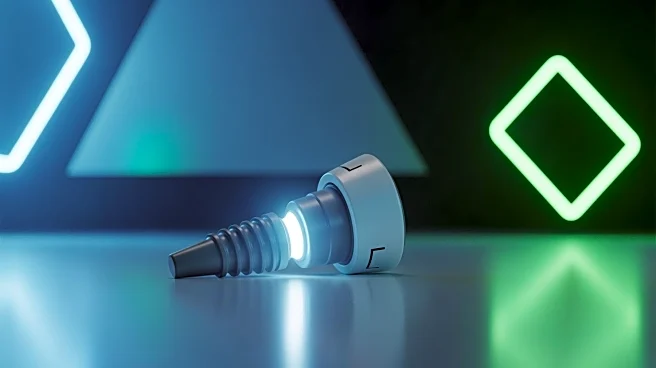What's Happening?
Onkos Surgical has announced that it received 510(k) clearance from the U.S. Food and Drug Administration (FDA) for its ELEOS Proximal Tibia with NanoCept Antibacterial Technology. This clearance marks a significant milestone for the NanoCept technology,
which was initially granted De Novo authorization in April 2024. The NanoCept technology is designed to combat intraoperative bacterial contamination, a critical issue in orthopaedic surgeries. Preclinical studies have shown that NanoCept can achieve a 99.999% kill rate of bacteria commonly found in operating rooms. The technology is part of Onkos Surgical's ELEOS Limb Salvage System, which provides reconstruction options for patients suffering from significant bone loss due to cancer, trauma, or previous surgeries. The clearance allows Onkos Surgical to extend this antibacterial technology to challenging anatomical sites, enhancing surgical outcomes and patient care.
Why It's Important?
The FDA clearance of NanoCept Antibacterial Technology is a pivotal development in the field of orthopaedic surgery, addressing the persistent challenge of bacterial contamination during operations. This advancement is expected to improve surgical outcomes and reduce infection rates, which can lead to faster recovery times and lower healthcare costs. For medical institutions and surgeons, the technology offers a new tool to enhance patient safety and surgical precision. The clearance also signifies Onkos Surgical's commitment to innovation in medical devices, potentially setting a precedent for future antibacterial technologies in orthopaedics. As the demand for such technologies grows, this development could influence industry standards and practices, benefiting both healthcare providers and patients.
What's Next?
Following the FDA clearance, Onkos Surgical plans to integrate the NanoCept technology more broadly within its ELEOS implant system. The company aims to support surgeons with innovative solutions that address complex orthopaedic challenges. As the technology becomes more widely adopted, Onkos Surgical may pursue additional clearances for other anatomical sites and applications. The company is likely to continue its research and development efforts to further enhance the effectiveness of its antibacterial technologies. Stakeholders, including medical institutions and healthcare providers, will be closely monitoring the clinical outcomes and potential expansion of NanoCept technology in orthopaedic surgeries.
Beyond the Headlines
The introduction of NanoCept Antibacterial Technology raises important ethical and legal considerations regarding the use of advanced medical technologies. While the technology promises significant benefits, it also necessitates rigorous clinical trials to ensure safety and efficacy in human applications. The legal framework governing medical device approvals may need to adapt to accommodate such innovations. Additionally, the widespread adoption of antibacterial technologies could shift cultural perceptions of surgical safety and hygiene, potentially leading to new standards in medical practice.
















